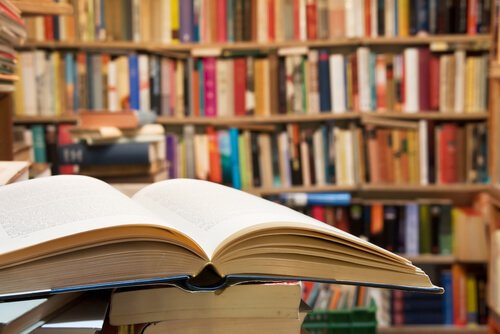The Educational Value of Libraries

The educational value of libraries isn’t something of the past. Libraries still exist all over the world, refusing to give into this digital age.
Many people have precious memories of spending long hours reading in their local library. If you wanted to discover a new story, study, research or consult academic information, the library was the place to go.
Although things have changed due to technology and the internet, it’s important to appreciate and recognize the educational value of libraries.
Libraries as cultural heritage
Knowledge is infinite, and that’s why libraries will never go out of style. The educational value of libraries stays alive because their objective is teaching and learning.
A great part of the world’s population still reaps the benefits of public, school, university and specialized libraries.
Libraries provide an accessible and inclusive space for people to read and enjoy books. These places promote cultural diversity and values like tolerance, respect and peace.
The importance of libraries
The success of libraries lies in the fact that they provide essential information, especially for the student community. They also help scholars develop their imagination and their intellectual curiosity.
The pedagogical and educational value of libraries has to do with literacy, education and general information.
UNESCO and the International Federation of Library Associations and Institutions (IFLA) recognize the importance of these homes of cultural knowledge. Libraries offer the opportunity to readers to develop critical thinking.
What’s more, these spaces are open to people of all backgrounds, nationalities, cultures, religions, political opinions, etc. All this, without commercial interests. This makes them an educational pillar of society.
What is the pedagogical value of libraries based on?
The educational value of libraries lies in the fact that the didactic material is ideal for giving users access to certain tools. Theoretical and practical contents pass on emotional, physical and cognitive abilities and aptitudes.
Libraries also offer formative resources for education. The materials found in libraries are chosen, designed and adapted to the current situation and social environment of individuals.

The objectives of libraries
The educational value of libraries is based on several objectives that propel students to reach their academic goals. These objectives include:
- Instilling good habits regarding learning and reading.
- Encouraging the appreciation of books as a source of universal knowledge.
- Supporting the educational system.
- Offering healthy entertainment through the development of the imagination and reading comprehension.
- Facilitating access to regional, national and international resources in order to discover multicultural ideas, opinions and experiences.
- Organizing projects that raise awareness and sensitivity to social issues.
- Promoting intellectual freedom to form responsible citizens.
“Libraries provide an accessible and inclusive space for people to read and enjoy books. These places promote cultural diversity and values like tolerance, respect and peace.”
The characteristics of libraries
Libraries are attractive because they allow us to read, learn about and research a wide range of subjects, from the most frivolous to the most complex. Libraries consist of different sections: Children, youth, professionals, history, comics, novels and much more.
These institutions teach children to be autonomous, disciplined and responsible through their systems of personal membership and book loaning.
Beyond their traditional methods, libraries are also open to new information technology. They also organize complementary activities for diverse groups of people.
Libraries as an educational resource and tool
Libraries are, above all else, a place where we can enjoy reading. They contain collections of books and materials that are created and designed to offer a wealth of information.
Reading is a fundamental means for improving any area of knowledge and satisfying personal interests. Libraries offer a series of tools and services that aid in this process:
- Loaning books and magazines.
- Librarian assistance.
- Cultural activities, classes and workshops.
- Use of computers with internet access.
- Online reading.
- Downloading of documents in electronic form.
- Reading programs and book clubs

Why do people go to libraries?
The educational value of libraries isn’t limited to the student population. In fact, any person can access and take advantage of their services. Below are the main reasons why people go to the library:
- Academic education: This refers to studies and academic formation from a young age.
- Studies and training for people in the working world.
- A healthy recreational activity for people of any age.
- The use of computers with internet access to access various types of information and other tools.
- Preparation for employment and learning languages.
As you can see, the educational value of libraries is none other than broadening our horizons in regards to reading, communication and problem solving.
In these spaces, children discover a love for literature. They’re boundary-free refuges of knowledge that are open to all people.
Only one question remains: When was the last time you went to the library?
All cited sources were thoroughly reviewed by our team to ensure their quality, reliability, currency, and validity. The bibliography of this article was considered reliable and of academic or scientific accuracy.
- Carrillo Mora, F. P. (2013). Importancia de la biblioteca infantil en el desarrollo del lenguaje de los niños de 4 años de edad del centro infantil mundo de ilusiones de la ciudad de ambato.(Bachelor’s thesis). http://192.188.46.193/handle/123456789/5106
- Rodríguez, J. A. C., Valencia, J., & Arias, A. V. (2013). Las bibliotecas públicas como escenarios de participación ciudadana e inclusión social. Rastros Rostros, 15(29), 73-81. https://dialnet.unirioja.es/servlet/articulo?codigo=6515629
- Fernández Aguado, M. S. (2015). La importancia de las bibliotecas escolares en la educación: la biblioteca de Amelia. https://repositorio.unican.es/xmlui/handle/10902/7601
This text is provided for informational purposes only and does not replace consultation with a professional. If in doubt, consult your specialist.








